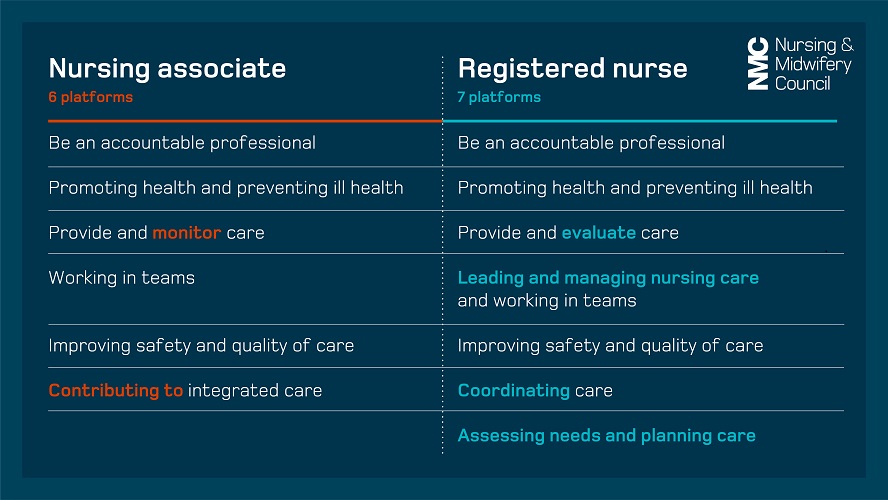Blog: Role differences between nursing associates and nurses
Published on 13 March 2019
Sue West, Senior Nursing Education Adviser, talks about the respective roles of nursing associates and nurses.
It’s just over a month since we opened our register to nursing associates in England and I’m aware that there might still be some confusion about the role and how it differs to that of the registered nurse.
So, I thought I might use this opportunity to share some helpful information about the role, what patients, families and the public can expect from the care given by a nursing associate and how this differs to the role of the registered nurse.
What is a nursing associate?
For those of you not so familiar with the new role, nursing associates are new members of the nursing team who provide care and support to people using health and social care services across England. The role was developed to bridge the gap between health care assistants and graduate nurses and provide a route for career progression to those who wish to become a registered nurse.
Nursing associates have to complete a foundation degree, typically two years of higher education. When they’ve successfully completed their course, all nursing associates will have to register with us, the NMC, if they are to work in a health and care setting under this title in England.
What might a nursing associate do?
Over the coming years more and more people who use health and care services will benefit from the care given by nursing associates in a range of settings. And while it’s not our job to set out what they can and can’t do, we do make sure that they can demonstrate the knowledge and skills required - as set out in our standards - to deliver better, safer care before they enter the workforce. Once on our register nursing associates – like nurses and midwives - can enhance their knowledge and skills within their scope of practice throughout their career. It is important to remember that there is one exception to this rule. Nursing associates are not able to prescribe.
While nursing associates will contribute to most aspects of care, including delivery and monitoring, registered nurses will take the lead on assessment, planning and evaluation. Nurses will also lead on managing and coordinating care with full contribution from the nursing associate within the integrated care team.
To set this out clearly we’ve developed this helpful graphic which highlights the main differences between the two roles.

Together with our standards there is also some really helpful guidance out there which sets out the differences and also that supports the safe deployment of the role. If you haven’t seen it, do take a look at Health Education England’s website on nursing associates, the National Health Service Improvement and National Health Employers.
Value of the role
As a registered nurse and educator, I know the value of the support role in freeing up nurses’ time to lead and coordinate care and deal with any complex care needs. The role of the nursing associate will no doubt give more time for nurses to do just that.
We’re very excited about nursing associates joining the nursing team and know that they really respect and admire what nurses do. They want to be able to take some of the pressure off by taking on appropriate responsibilities and working together with nurses and integrated care teams to deliver the best and safest care.
Need more help?
If you need more information or have further questions the team is always happy to help. You can also sign up to our newsletters for the latest news.
Related resources
- Becoming a nurse
- Standards for nurses and an easy read version of Standards for nurses
- Become a nursing associate
- Approved programmes use the filters to find a university or a course
- Standards of proficiency for nursing associates sets out what we expect all nursing associates to know and be able to do in order to join our register
- Standards for pre-registration nursing associate programmes
- Case studies from newly-qualified registered nursing associates
- Webinar for nursing associate students who are planning to apply to join our register
- Supporting information find supporting information including a webinar on specific themes based on questions you have asked us
- Webinar - How we quality assure
- Webinar on the new role of practice assessor and academic assessor
- Standards for student supervision and assessment
Other recent news…
Blog: Implementing Martha’s Rule in nursing and midwifery care: why it matters
Published on 09 September 2024
As plans to roll out Martha’s Rule continue in England, Executive Nurse Director at the NMC, Sam Foster, explains the significance of Martha’s Rule and how it r
Blog: #FutureCommunityNurse: making the most of this opportunity
Published on 05 July 2021
Our Chief Executive and Registrar, Andrea Sutcliffe, explains why your involvement in our consultation on draft standards for community and public health nursin
Blog: What we’re doing to improve how we regulate, for the benefit of the people we serve
Published on 02 June 2021
In her latest blog, Andrea Sutcliffe, our Chief Executive and Registrar, explains what we’re doing to improve how we regulate, for the benefit of the people we






